Reflective Essay on Clinical Placement Experience in Hospital
VerifiedAdded on 2023/04/08
|9
|2036
|303
Essay
AI Summary
This essay is a reflective account of a clinical experience during a hospital placement, utilizing Gibbs' reflective cycle. The author reflects on caring for an 80-year-old patient with multiple chronic conditions, highlighting challenges in communication and empathy. The reflection details feelings of disappointment and distress due to negative feedback from the patient. The evaluation section discusses the importance of effective communication in building therapeutic relationships and improving patient outcomes. The analysis identifies inappropriate communication approaches, including non-verbal cues, active listening skills, empathy, and informed consent. The conclusion emphasizes the need to develop better communication skills and outlines an action plan involving training sessions, feedback, and evidence-based research to enhance patient care. Desklib offers similar solved assignments and past papers for students.
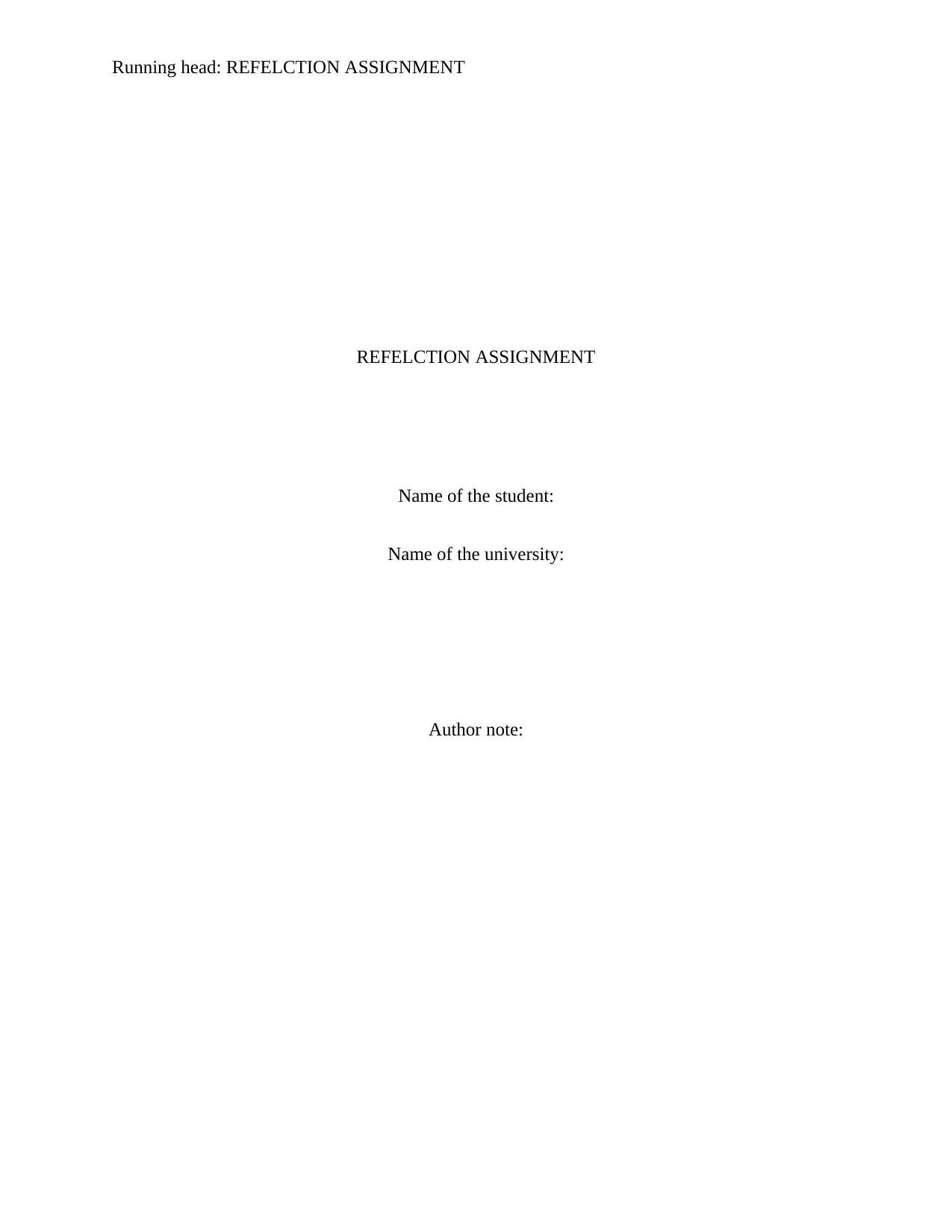
Running head: REFELCTION ASSIGNMENT
REFELCTION ASSIGNMENT
Name of the student:
Name of the university:
Author note:
REFELCTION ASSIGNMENT
Name of the student:
Name of the university:
Author note:
Paraphrase This Document
Need a fresh take? Get an instant paraphrase of this document with our AI Paraphraser
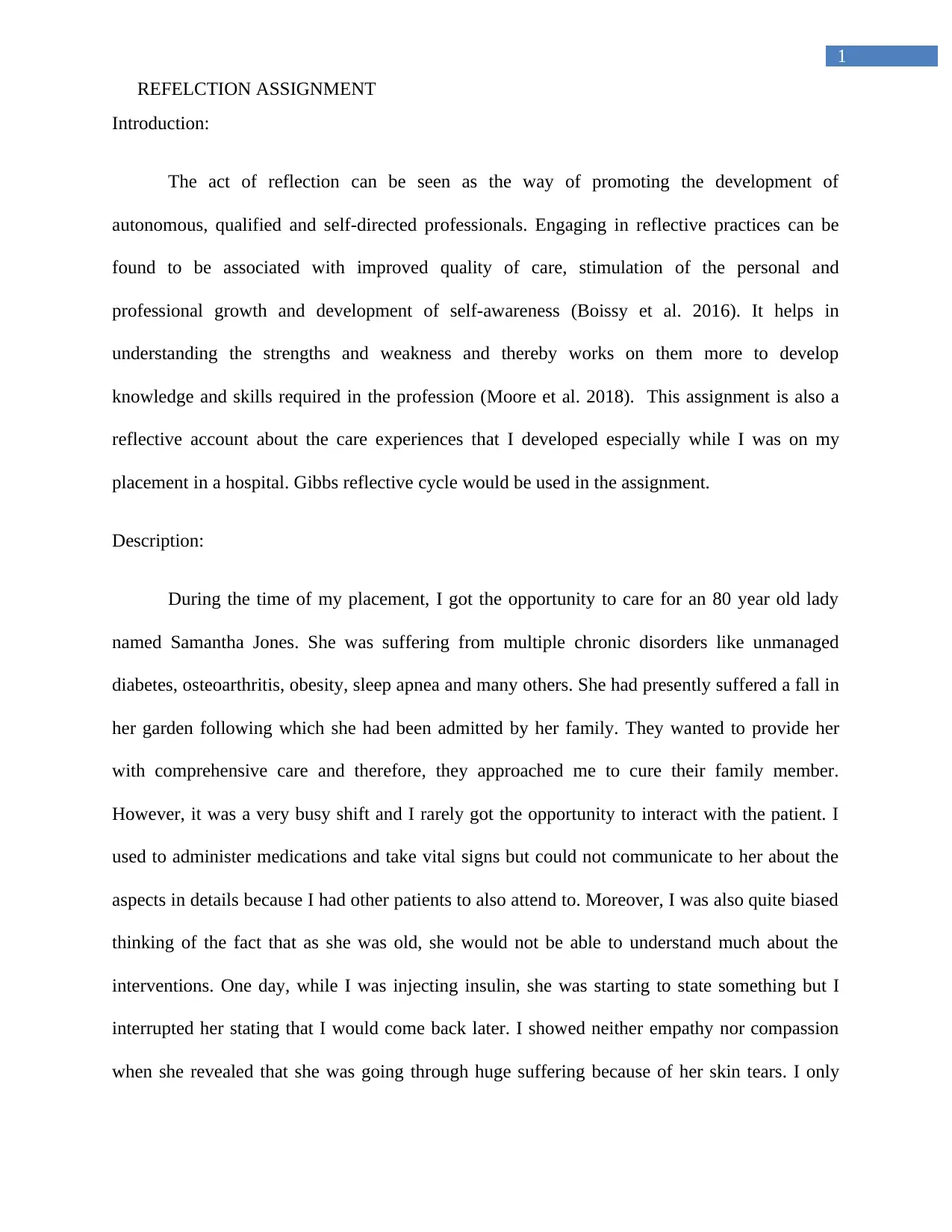
1
REFELCTION ASSIGNMENT
Introduction:
The act of reflection can be seen as the way of promoting the development of
autonomous, qualified and self-directed professionals. Engaging in reflective practices can be
found to be associated with improved quality of care, stimulation of the personal and
professional growth and development of self-awareness (Boissy et al. 2016). It helps in
understanding the strengths and weakness and thereby works on them more to develop
knowledge and skills required in the profession (Moore et al. 2018). This assignment is also a
reflective account about the care experiences that I developed especially while I was on my
placement in a hospital. Gibbs reflective cycle would be used in the assignment.
Description:
During the time of my placement, I got the opportunity to care for an 80 year old lady
named Samantha Jones. She was suffering from multiple chronic disorders like unmanaged
diabetes, osteoarthritis, obesity, sleep apnea and many others. She had presently suffered a fall in
her garden following which she had been admitted by her family. They wanted to provide her
with comprehensive care and therefore, they approached me to cure their family member.
However, it was a very busy shift and I rarely got the opportunity to interact with the patient. I
used to administer medications and take vital signs but could not communicate to her about the
aspects in details because I had other patients to also attend to. Moreover, I was also quite biased
thinking of the fact that as she was old, she would not be able to understand much about the
interventions. One day, while I was injecting insulin, she was starting to state something but I
interrupted her stating that I would come back later. I showed neither empathy nor compassion
when she revealed that she was going through huge suffering because of her skin tears. I only
REFELCTION ASSIGNMENT
Introduction:
The act of reflection can be seen as the way of promoting the development of
autonomous, qualified and self-directed professionals. Engaging in reflective practices can be
found to be associated with improved quality of care, stimulation of the personal and
professional growth and development of self-awareness (Boissy et al. 2016). It helps in
understanding the strengths and weakness and thereby works on them more to develop
knowledge and skills required in the profession (Moore et al. 2018). This assignment is also a
reflective account about the care experiences that I developed especially while I was on my
placement in a hospital. Gibbs reflective cycle would be used in the assignment.
Description:
During the time of my placement, I got the opportunity to care for an 80 year old lady
named Samantha Jones. She was suffering from multiple chronic disorders like unmanaged
diabetes, osteoarthritis, obesity, sleep apnea and many others. She had presently suffered a fall in
her garden following which she had been admitted by her family. They wanted to provide her
with comprehensive care and therefore, they approached me to cure their family member.
However, it was a very busy shift and I rarely got the opportunity to interact with the patient. I
used to administer medications and take vital signs but could not communicate to her about the
aspects in details because I had other patients to also attend to. Moreover, I was also quite biased
thinking of the fact that as she was old, she would not be able to understand much about the
interventions. One day, while I was injecting insulin, she was starting to state something but I
interrupted her stating that I would come back later. I showed neither empathy nor compassion
when she revealed that she was going through huge suffering because of her skin tears. I only
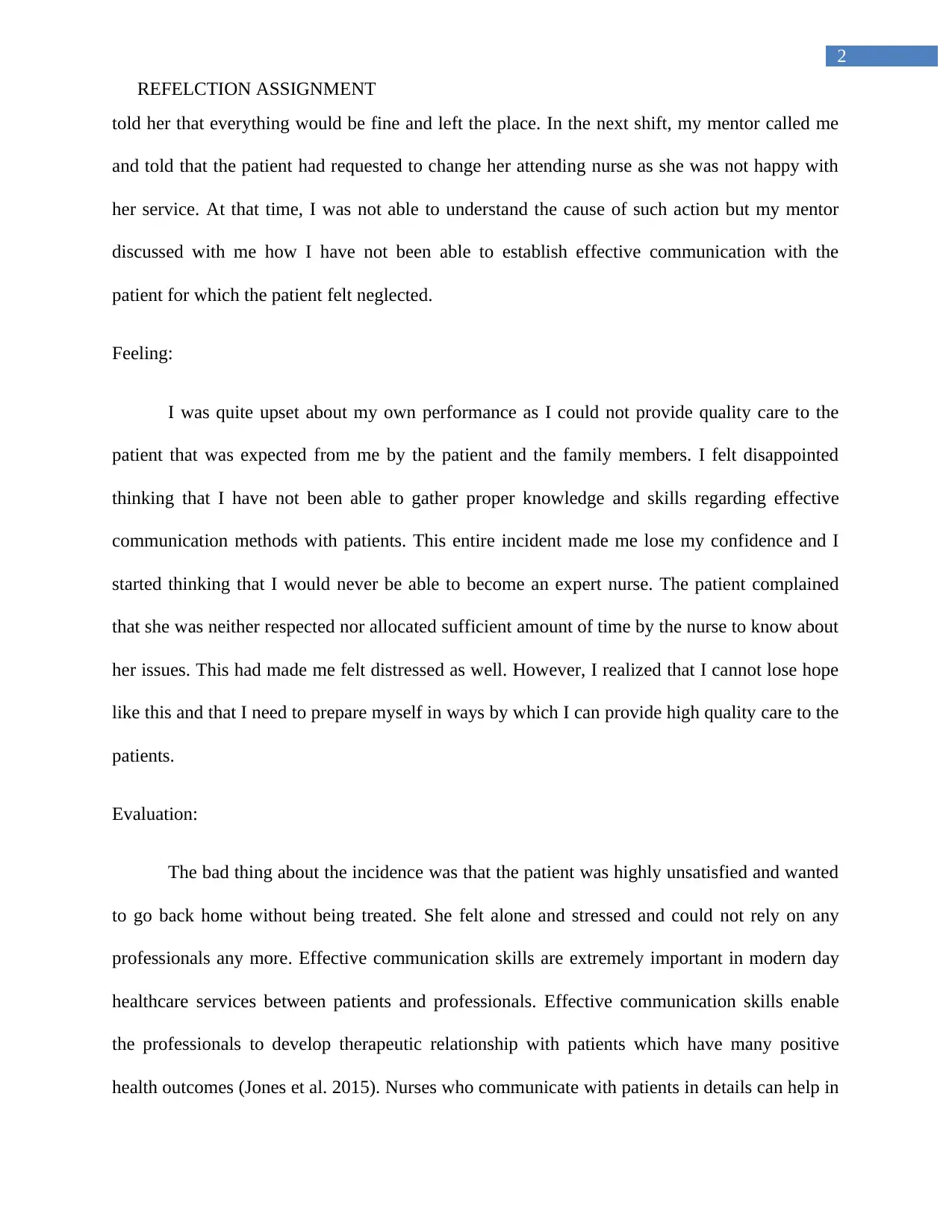
2
REFELCTION ASSIGNMENT
told her that everything would be fine and left the place. In the next shift, my mentor called me
and told that the patient had requested to change her attending nurse as she was not happy with
her service. At that time, I was not able to understand the cause of such action but my mentor
discussed with me how I have not been able to establish effective communication with the
patient for which the patient felt neglected.
Feeling:
I was quite upset about my own performance as I could not provide quality care to the
patient that was expected from me by the patient and the family members. I felt disappointed
thinking that I have not been able to gather proper knowledge and skills regarding effective
communication methods with patients. This entire incident made me lose my confidence and I
started thinking that I would never be able to become an expert nurse. The patient complained
that she was neither respected nor allocated sufficient amount of time by the nurse to know about
her issues. This had made me felt distressed as well. However, I realized that I cannot lose hope
like this and that I need to prepare myself in ways by which I can provide high quality care to the
patients.
Evaluation:
The bad thing about the incidence was that the patient was highly unsatisfied and wanted
to go back home without being treated. She felt alone and stressed and could not rely on any
professionals any more. Effective communication skills are extremely important in modern day
healthcare services between patients and professionals. Effective communication skills enable
the professionals to develop therapeutic relationship with patients which have many positive
health outcomes (Jones et al. 2015). Nurses who communicate with patients in details can help in
REFELCTION ASSIGNMENT
told her that everything would be fine and left the place. In the next shift, my mentor called me
and told that the patient had requested to change her attending nurse as she was not happy with
her service. At that time, I was not able to understand the cause of such action but my mentor
discussed with me how I have not been able to establish effective communication with the
patient for which the patient felt neglected.
Feeling:
I was quite upset about my own performance as I could not provide quality care to the
patient that was expected from me by the patient and the family members. I felt disappointed
thinking that I have not been able to gather proper knowledge and skills regarding effective
communication methods with patients. This entire incident made me lose my confidence and I
started thinking that I would never be able to become an expert nurse. The patient complained
that she was neither respected nor allocated sufficient amount of time by the nurse to know about
her issues. This had made me felt distressed as well. However, I realized that I cannot lose hope
like this and that I need to prepare myself in ways by which I can provide high quality care to the
patients.
Evaluation:
The bad thing about the incidence was that the patient was highly unsatisfied and wanted
to go back home without being treated. She felt alone and stressed and could not rely on any
professionals any more. Effective communication skills are extremely important in modern day
healthcare services between patients and professionals. Effective communication skills enable
the professionals to develop therapeutic relationship with patients which have many positive
health outcomes (Jones et al. 2015). Nurses who communicate with patients in details can help in
⊘ This is a preview!⊘
Do you want full access?
Subscribe today to unlock all pages.

Trusted by 1+ million students worldwide
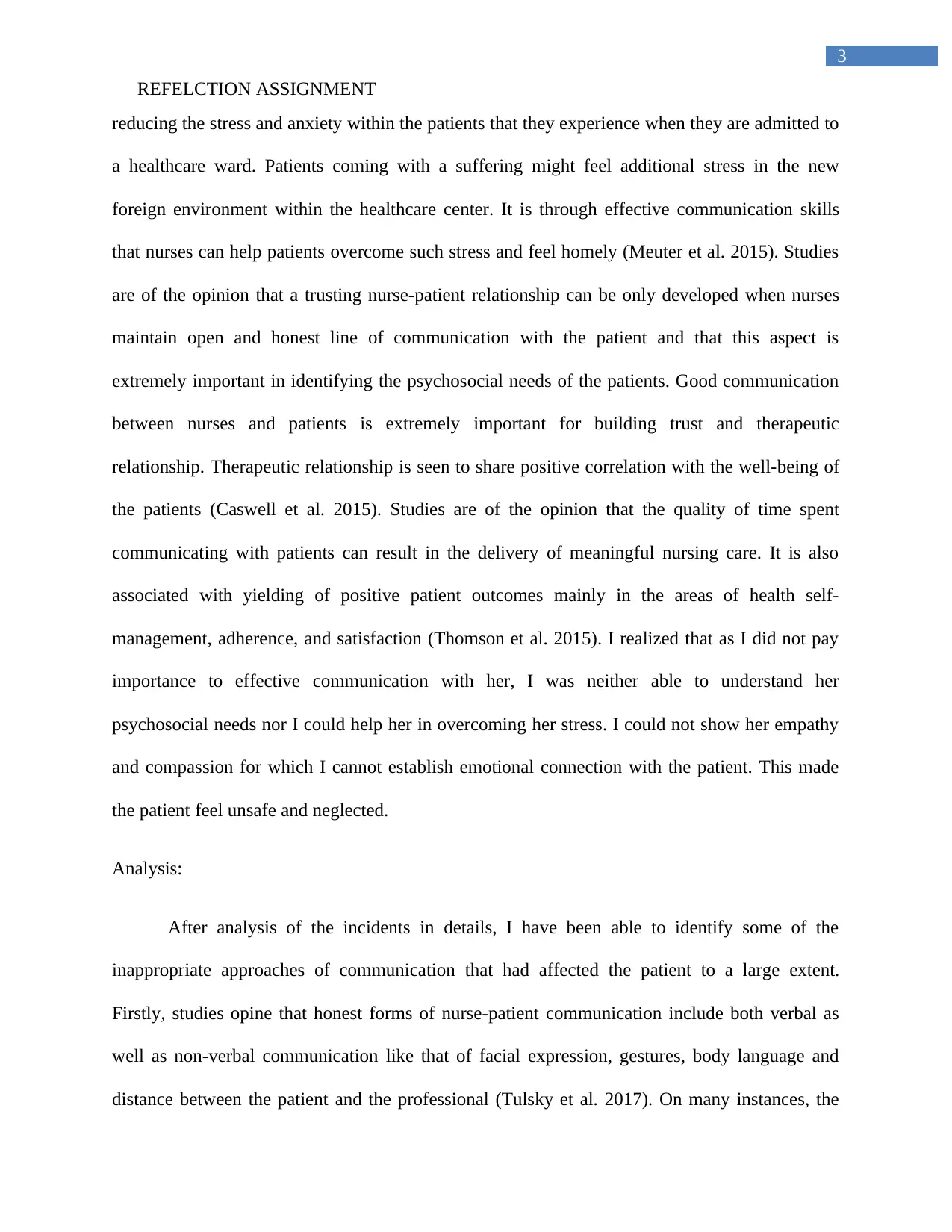
3
REFELCTION ASSIGNMENT
reducing the stress and anxiety within the patients that they experience when they are admitted to
a healthcare ward. Patients coming with a suffering might feel additional stress in the new
foreign environment within the healthcare center. It is through effective communication skills
that nurses can help patients overcome such stress and feel homely (Meuter et al. 2015). Studies
are of the opinion that a trusting nurse-patient relationship can be only developed when nurses
maintain open and honest line of communication with the patient and that this aspect is
extremely important in identifying the psychosocial needs of the patients. Good communication
between nurses and patients is extremely important for building trust and therapeutic
relationship. Therapeutic relationship is seen to share positive correlation with the well-being of
the patients (Caswell et al. 2015). Studies are of the opinion that the quality of time spent
communicating with patients can result in the delivery of meaningful nursing care. It is also
associated with yielding of positive patient outcomes mainly in the areas of health self-
management, adherence, and satisfaction (Thomson et al. 2015). I realized that as I did not pay
importance to effective communication with her, I was neither able to understand her
psychosocial needs nor I could help her in overcoming her stress. I could not show her empathy
and compassion for which I cannot establish emotional connection with the patient. This made
the patient feel unsafe and neglected.
Analysis:
After analysis of the incidents in details, I have been able to identify some of the
inappropriate approaches of communication that had affected the patient to a large extent.
Firstly, studies opine that honest forms of nurse-patient communication include both verbal as
well as non-verbal communication like that of facial expression, gestures, body language and
distance between the patient and the professional (Tulsky et al. 2017). On many instances, the
REFELCTION ASSIGNMENT
reducing the stress and anxiety within the patients that they experience when they are admitted to
a healthcare ward. Patients coming with a suffering might feel additional stress in the new
foreign environment within the healthcare center. It is through effective communication skills
that nurses can help patients overcome such stress and feel homely (Meuter et al. 2015). Studies
are of the opinion that a trusting nurse-patient relationship can be only developed when nurses
maintain open and honest line of communication with the patient and that this aspect is
extremely important in identifying the psychosocial needs of the patients. Good communication
between nurses and patients is extremely important for building trust and therapeutic
relationship. Therapeutic relationship is seen to share positive correlation with the well-being of
the patients (Caswell et al. 2015). Studies are of the opinion that the quality of time spent
communicating with patients can result in the delivery of meaningful nursing care. It is also
associated with yielding of positive patient outcomes mainly in the areas of health self-
management, adherence, and satisfaction (Thomson et al. 2015). I realized that as I did not pay
importance to effective communication with her, I was neither able to understand her
psychosocial needs nor I could help her in overcoming her stress. I could not show her empathy
and compassion for which I cannot establish emotional connection with the patient. This made
the patient feel unsafe and neglected.
Analysis:
After analysis of the incidents in details, I have been able to identify some of the
inappropriate approaches of communication that had affected the patient to a large extent.
Firstly, studies opine that honest forms of nurse-patient communication include both verbal as
well as non-verbal communication like that of facial expression, gestures, body language and
distance between the patient and the professional (Tulsky et al. 2017). On many instances, the
Paraphrase This Document
Need a fresh take? Get an instant paraphrase of this document with our AI Paraphraser
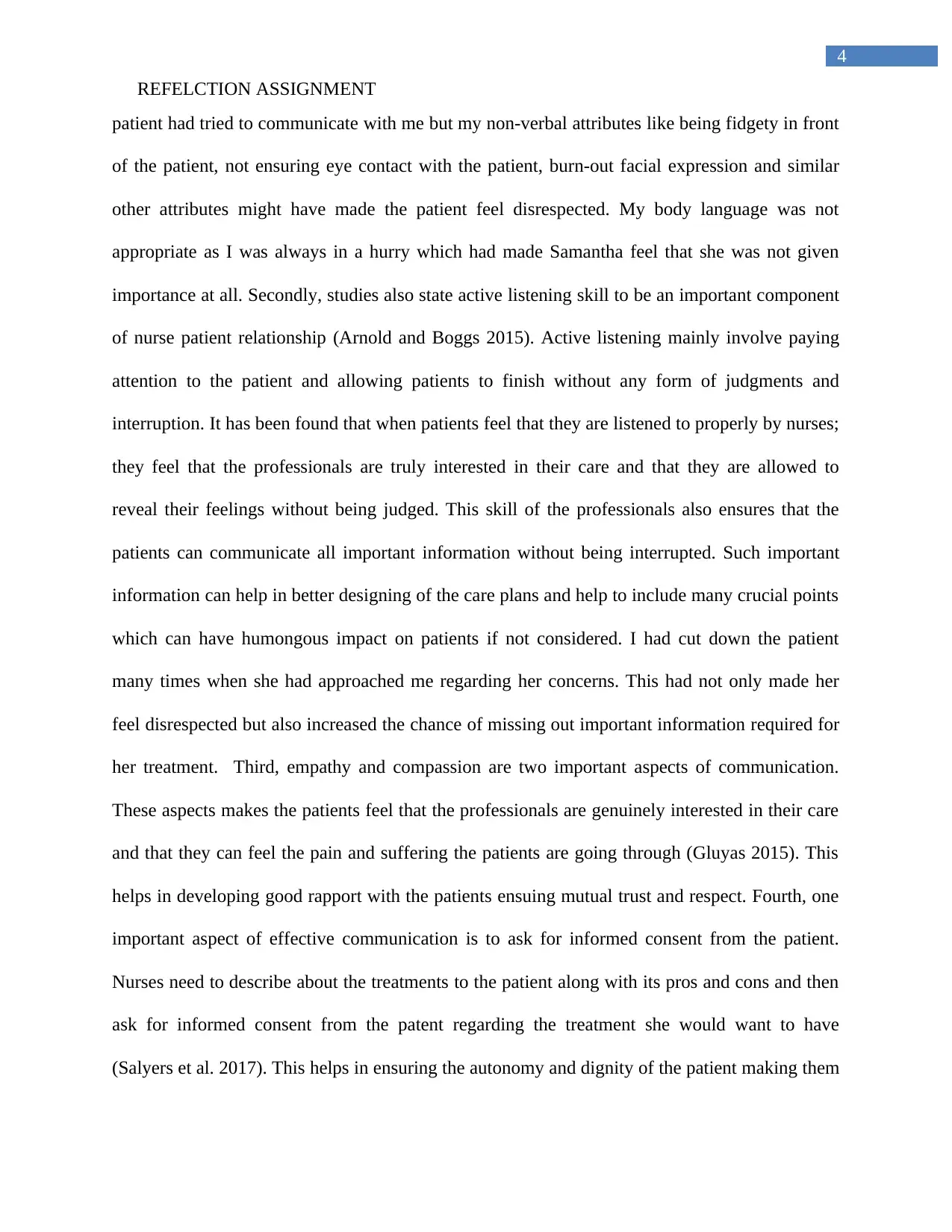
4
REFELCTION ASSIGNMENT
patient had tried to communicate with me but my non-verbal attributes like being fidgety in front
of the patient, not ensuring eye contact with the patient, burn-out facial expression and similar
other attributes might have made the patient feel disrespected. My body language was not
appropriate as I was always in a hurry which had made Samantha feel that she was not given
importance at all. Secondly, studies also state active listening skill to be an important component
of nurse patient relationship (Arnold and Boggs 2015). Active listening mainly involve paying
attention to the patient and allowing patients to finish without any form of judgments and
interruption. It has been found that when patients feel that they are listened to properly by nurses;
they feel that the professionals are truly interested in their care and that they are allowed to
reveal their feelings without being judged. This skill of the professionals also ensures that the
patients can communicate all important information without being interrupted. Such important
information can help in better designing of the care plans and help to include many crucial points
which can have humongous impact on patients if not considered. I had cut down the patient
many times when she had approached me regarding her concerns. This had not only made her
feel disrespected but also increased the chance of missing out important information required for
her treatment. Third, empathy and compassion are two important aspects of communication.
These aspects makes the patients feel that the professionals are genuinely interested in their care
and that they can feel the pain and suffering the patients are going through (Gluyas 2015). This
helps in developing good rapport with the patients ensuing mutual trust and respect. Fourth, one
important aspect of effective communication is to ask for informed consent from the patient.
Nurses need to describe about the treatments to the patient along with its pros and cons and then
ask for informed consent from the patent regarding the treatment she would want to have
(Salyers et al. 2017). This helps in ensuring the autonomy and dignity of the patient making them
REFELCTION ASSIGNMENT
patient had tried to communicate with me but my non-verbal attributes like being fidgety in front
of the patient, not ensuring eye contact with the patient, burn-out facial expression and similar
other attributes might have made the patient feel disrespected. My body language was not
appropriate as I was always in a hurry which had made Samantha feel that she was not given
importance at all. Secondly, studies also state active listening skill to be an important component
of nurse patient relationship (Arnold and Boggs 2015). Active listening mainly involve paying
attention to the patient and allowing patients to finish without any form of judgments and
interruption. It has been found that when patients feel that they are listened to properly by nurses;
they feel that the professionals are truly interested in their care and that they are allowed to
reveal their feelings without being judged. This skill of the professionals also ensures that the
patients can communicate all important information without being interrupted. Such important
information can help in better designing of the care plans and help to include many crucial points
which can have humongous impact on patients if not considered. I had cut down the patient
many times when she had approached me regarding her concerns. This had not only made her
feel disrespected but also increased the chance of missing out important information required for
her treatment. Third, empathy and compassion are two important aspects of communication.
These aspects makes the patients feel that the professionals are genuinely interested in their care
and that they can feel the pain and suffering the patients are going through (Gluyas 2015). This
helps in developing good rapport with the patients ensuing mutual trust and respect. Fourth, one
important aspect of effective communication is to ask for informed consent from the patient.
Nurses need to describe about the treatments to the patient along with its pros and cons and then
ask for informed consent from the patent regarding the treatment she would want to have
(Salyers et al. 2017). This helps in ensuring the autonomy and dignity of the patient making them
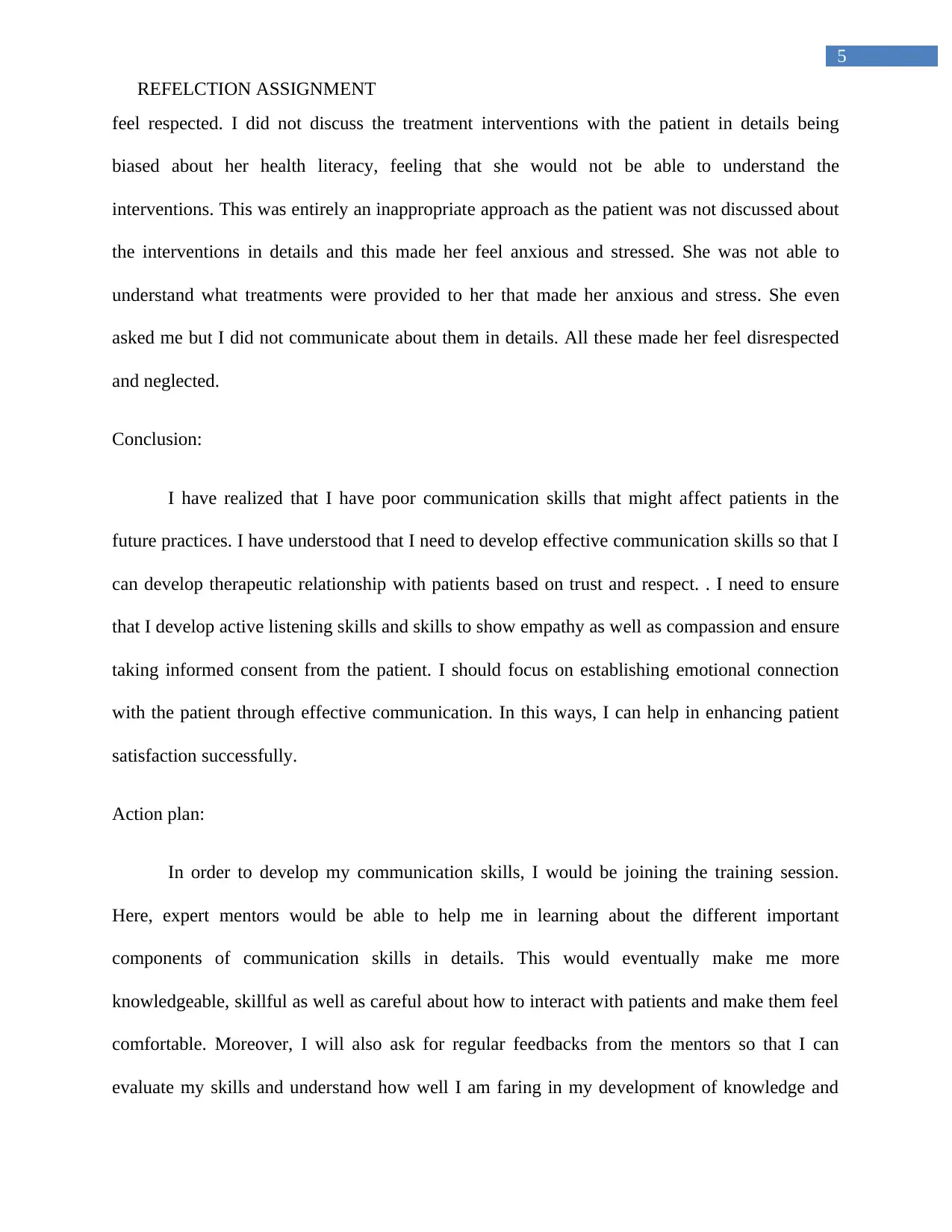
5
REFELCTION ASSIGNMENT
feel respected. I did not discuss the treatment interventions with the patient in details being
biased about her health literacy, feeling that she would not be able to understand the
interventions. This was entirely an inappropriate approach as the patient was not discussed about
the interventions in details and this made her feel anxious and stressed. She was not able to
understand what treatments were provided to her that made her anxious and stress. She even
asked me but I did not communicate about them in details. All these made her feel disrespected
and neglected.
Conclusion:
I have realized that I have poor communication skills that might affect patients in the
future practices. I have understood that I need to develop effective communication skills so that I
can develop therapeutic relationship with patients based on trust and respect. . I need to ensure
that I develop active listening skills and skills to show empathy as well as compassion and ensure
taking informed consent from the patient. I should focus on establishing emotional connection
with the patient through effective communication. In this ways, I can help in enhancing patient
satisfaction successfully.
Action plan:
In order to develop my communication skills, I would be joining the training session.
Here, expert mentors would be able to help me in learning about the different important
components of communication skills in details. This would eventually make me more
knowledgeable, skillful as well as careful about how to interact with patients and make them feel
comfortable. Moreover, I will also ask for regular feedbacks from the mentors so that I can
evaluate my skills and understand how well I am faring in my development of knowledge and
REFELCTION ASSIGNMENT
feel respected. I did not discuss the treatment interventions with the patient in details being
biased about her health literacy, feeling that she would not be able to understand the
interventions. This was entirely an inappropriate approach as the patient was not discussed about
the interventions in details and this made her feel anxious and stressed. She was not able to
understand what treatments were provided to her that made her anxious and stress. She even
asked me but I did not communicate about them in details. All these made her feel disrespected
and neglected.
Conclusion:
I have realized that I have poor communication skills that might affect patients in the
future practices. I have understood that I need to develop effective communication skills so that I
can develop therapeutic relationship with patients based on trust and respect. . I need to ensure
that I develop active listening skills and skills to show empathy as well as compassion and ensure
taking informed consent from the patient. I should focus on establishing emotional connection
with the patient through effective communication. In this ways, I can help in enhancing patient
satisfaction successfully.
Action plan:
In order to develop my communication skills, I would be joining the training session.
Here, expert mentors would be able to help me in learning about the different important
components of communication skills in details. This would eventually make me more
knowledgeable, skillful as well as careful about how to interact with patients and make them feel
comfortable. Moreover, I will also ask for regular feedbacks from the mentors so that I can
evaluate my skills and understand how well I am faring in my development of knowledge and
⊘ This is a preview!⊘
Do you want full access?
Subscribe today to unlock all pages.

Trusted by 1+ million students worldwide
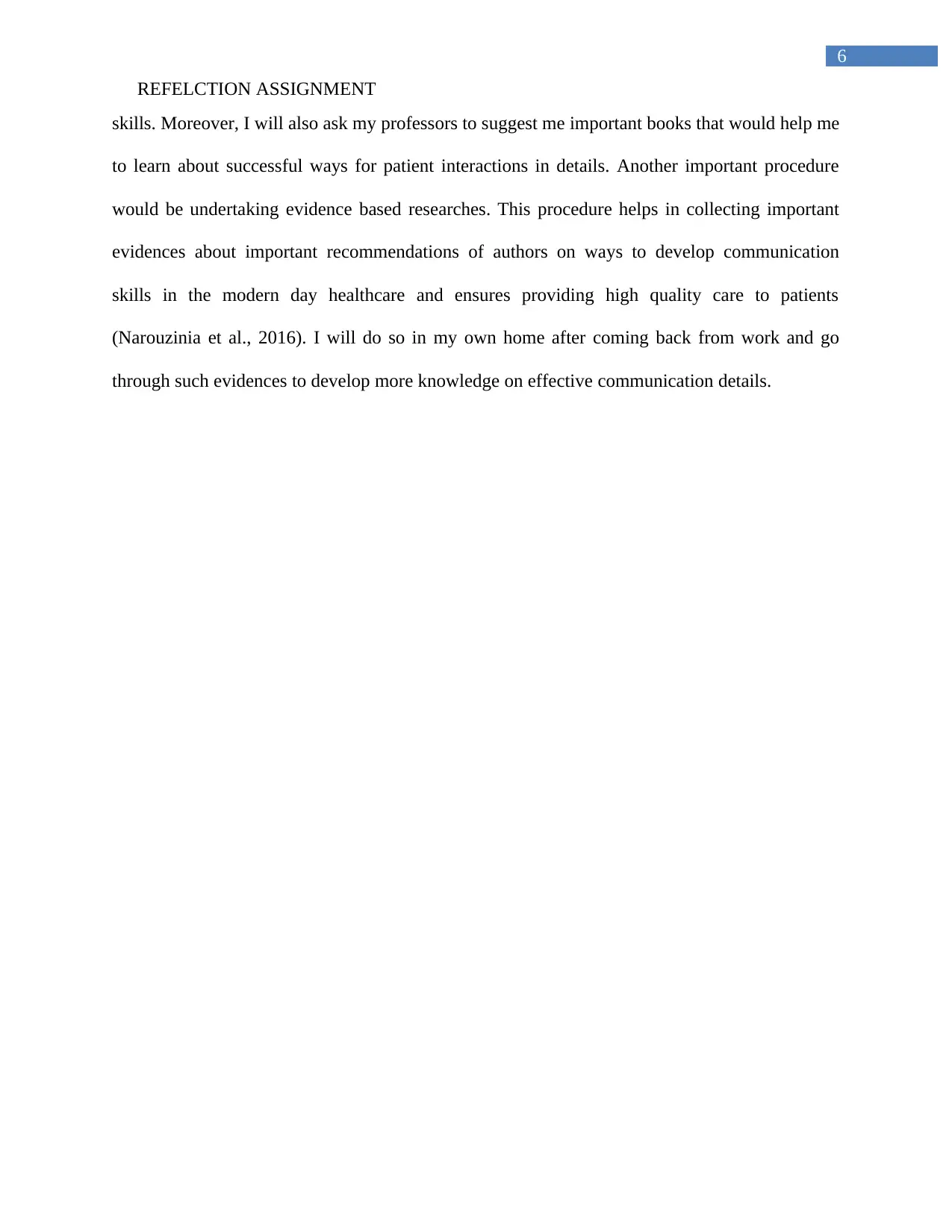
6
REFELCTION ASSIGNMENT
skills. Moreover, I will also ask my professors to suggest me important books that would help me
to learn about successful ways for patient interactions in details. Another important procedure
would be undertaking evidence based researches. This procedure helps in collecting important
evidences about important recommendations of authors on ways to develop communication
skills in the modern day healthcare and ensures providing high quality care to patients
(Narouzinia et al., 2016). I will do so in my own home after coming back from work and go
through such evidences to develop more knowledge on effective communication details.
REFELCTION ASSIGNMENT
skills. Moreover, I will also ask my professors to suggest me important books that would help me
to learn about successful ways for patient interactions in details. Another important procedure
would be undertaking evidence based researches. This procedure helps in collecting important
evidences about important recommendations of authors on ways to develop communication
skills in the modern day healthcare and ensures providing high quality care to patients
(Narouzinia et al., 2016). I will do so in my own home after coming back from work and go
through such evidences to develop more knowledge on effective communication details.
Paraphrase This Document
Need a fresh take? Get an instant paraphrase of this document with our AI Paraphraser
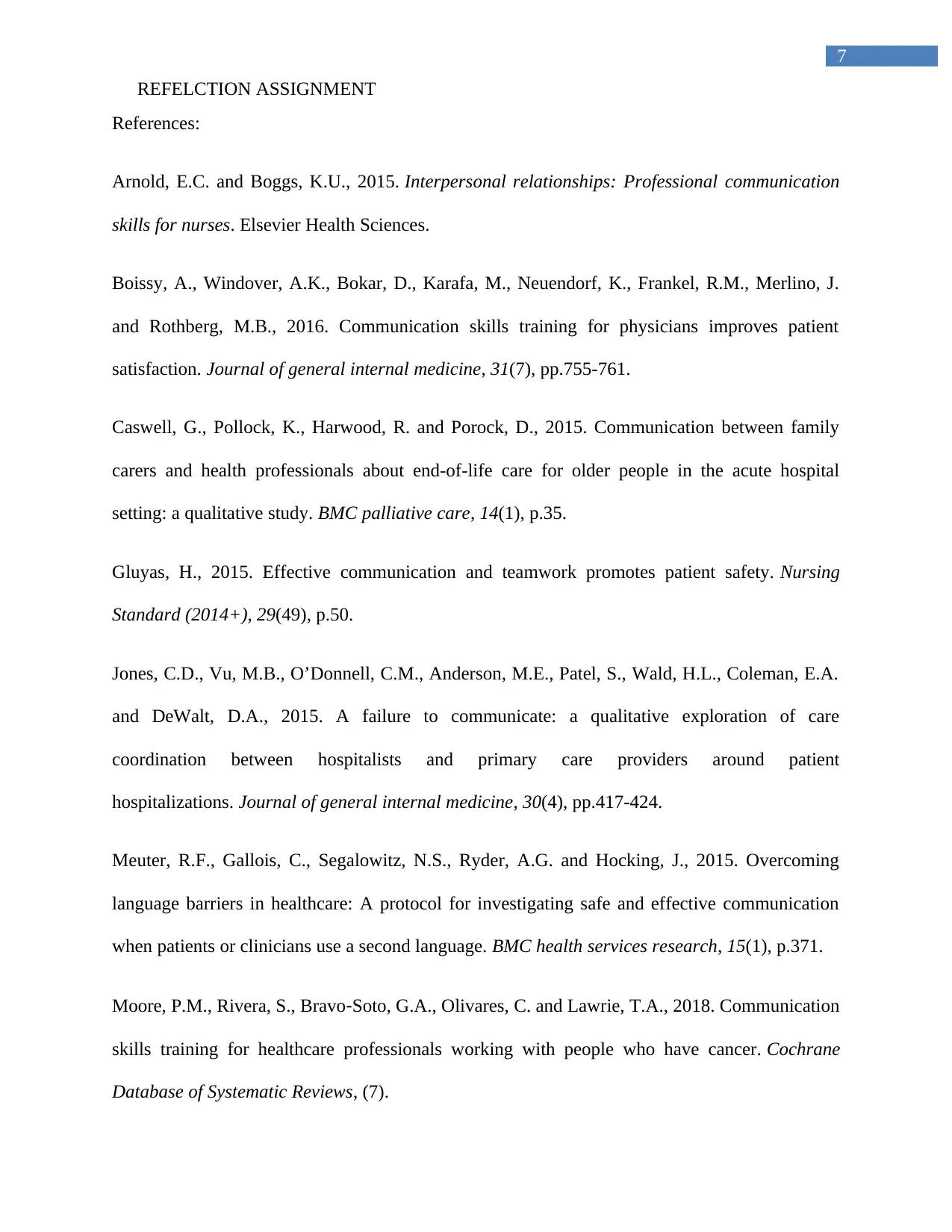
7
REFELCTION ASSIGNMENT
References:
Arnold, E.C. and Boggs, K.U., 2015. Interpersonal relationships: Professional communication
skills for nurses. Elsevier Health Sciences.
Boissy, A., Windover, A.K., Bokar, D., Karafa, M., Neuendorf, K., Frankel, R.M., Merlino, J.
and Rothberg, M.B., 2016. Communication skills training for physicians improves patient
satisfaction. Journal of general internal medicine, 31(7), pp.755-761.
Caswell, G., Pollock, K., Harwood, R. and Porock, D., 2015. Communication between family
carers and health professionals about end-of-life care for older people in the acute hospital
setting: a qualitative study. BMC palliative care, 14(1), p.35.
Gluyas, H., 2015. Effective communication and teamwork promotes patient safety. Nursing
Standard (2014+), 29(49), p.50.
Jones, C.D., Vu, M.B., O’Donnell, C.M., Anderson, M.E., Patel, S., Wald, H.L., Coleman, E.A.
and DeWalt, D.A., 2015. A failure to communicate: a qualitative exploration of care
coordination between hospitalists and primary care providers around patient
hospitalizations. Journal of general internal medicine, 30(4), pp.417-424.
Meuter, R.F., Gallois, C., Segalowitz, N.S., Ryder, A.G. and Hocking, J., 2015. Overcoming
language barriers in healthcare: A protocol for investigating safe and effective communication
when patients or clinicians use a second language. BMC health services research, 15(1), p.371.
Moore, P.M., Rivera, S., Bravo‐Soto, G.A., Olivares, C. and Lawrie, T.A., 2018. Communication
skills training for healthcare professionals working with people who have cancer. Cochrane
Database of Systematic Reviews, (7).
REFELCTION ASSIGNMENT
References:
Arnold, E.C. and Boggs, K.U., 2015. Interpersonal relationships: Professional communication
skills for nurses. Elsevier Health Sciences.
Boissy, A., Windover, A.K., Bokar, D., Karafa, M., Neuendorf, K., Frankel, R.M., Merlino, J.
and Rothberg, M.B., 2016. Communication skills training for physicians improves patient
satisfaction. Journal of general internal medicine, 31(7), pp.755-761.
Caswell, G., Pollock, K., Harwood, R. and Porock, D., 2015. Communication between family
carers and health professionals about end-of-life care for older people in the acute hospital
setting: a qualitative study. BMC palliative care, 14(1), p.35.
Gluyas, H., 2015. Effective communication and teamwork promotes patient safety. Nursing
Standard (2014+), 29(49), p.50.
Jones, C.D., Vu, M.B., O’Donnell, C.M., Anderson, M.E., Patel, S., Wald, H.L., Coleman, E.A.
and DeWalt, D.A., 2015. A failure to communicate: a qualitative exploration of care
coordination between hospitalists and primary care providers around patient
hospitalizations. Journal of general internal medicine, 30(4), pp.417-424.
Meuter, R.F., Gallois, C., Segalowitz, N.S., Ryder, A.G. and Hocking, J., 2015. Overcoming
language barriers in healthcare: A protocol for investigating safe and effective communication
when patients or clinicians use a second language. BMC health services research, 15(1), p.371.
Moore, P.M., Rivera, S., Bravo‐Soto, G.A., Olivares, C. and Lawrie, T.A., 2018. Communication
skills training for healthcare professionals working with people who have cancer. Cochrane
Database of Systematic Reviews, (7).
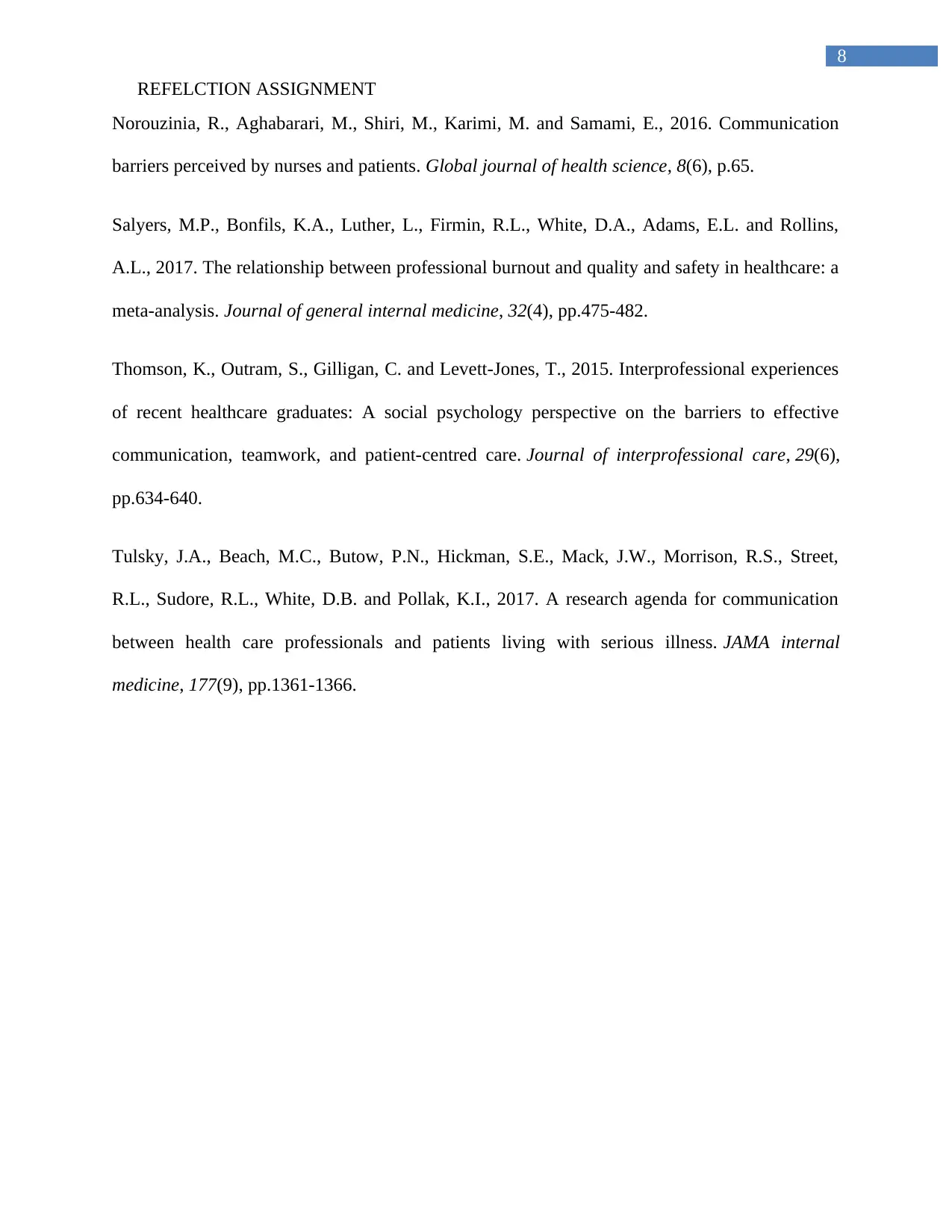
8
REFELCTION ASSIGNMENT
Norouzinia, R., Aghabarari, M., Shiri, M., Karimi, M. and Samami, E., 2016. Communication
barriers perceived by nurses and patients. Global journal of health science, 8(6), p.65.
Salyers, M.P., Bonfils, K.A., Luther, L., Firmin, R.L., White, D.A., Adams, E.L. and Rollins,
A.L., 2017. The relationship between professional burnout and quality and safety in healthcare: a
meta-analysis. Journal of general internal medicine, 32(4), pp.475-482.
Thomson, K., Outram, S., Gilligan, C. and Levett-Jones, T., 2015. Interprofessional experiences
of recent healthcare graduates: A social psychology perspective on the barriers to effective
communication, teamwork, and patient-centred care. Journal of interprofessional care, 29(6),
pp.634-640.
Tulsky, J.A., Beach, M.C., Butow, P.N., Hickman, S.E., Mack, J.W., Morrison, R.S., Street,
R.L., Sudore, R.L., White, D.B. and Pollak, K.I., 2017. A research agenda for communication
between health care professionals and patients living with serious illness. JAMA internal
medicine, 177(9), pp.1361-1366.
REFELCTION ASSIGNMENT
Norouzinia, R., Aghabarari, M., Shiri, M., Karimi, M. and Samami, E., 2016. Communication
barriers perceived by nurses and patients. Global journal of health science, 8(6), p.65.
Salyers, M.P., Bonfils, K.A., Luther, L., Firmin, R.L., White, D.A., Adams, E.L. and Rollins,
A.L., 2017. The relationship between professional burnout and quality and safety in healthcare: a
meta-analysis. Journal of general internal medicine, 32(4), pp.475-482.
Thomson, K., Outram, S., Gilligan, C. and Levett-Jones, T., 2015. Interprofessional experiences
of recent healthcare graduates: A social psychology perspective on the barriers to effective
communication, teamwork, and patient-centred care. Journal of interprofessional care, 29(6),
pp.634-640.
Tulsky, J.A., Beach, M.C., Butow, P.N., Hickman, S.E., Mack, J.W., Morrison, R.S., Street,
R.L., Sudore, R.L., White, D.B. and Pollak, K.I., 2017. A research agenda for communication
between health care professionals and patients living with serious illness. JAMA internal
medicine, 177(9), pp.1361-1366.
⊘ This is a preview!⊘
Do you want full access?
Subscribe today to unlock all pages.

Trusted by 1+ million students worldwide
1 out of 9
Related Documents
Your All-in-One AI-Powered Toolkit for Academic Success.
+13062052269
info@desklib.com
Available 24*7 on WhatsApp / Email
![[object Object]](/_next/static/media/star-bottom.7253800d.svg)
Unlock your academic potential
Copyright © 2020–2026 A2Z Services. All Rights Reserved. Developed and managed by ZUCOL.





